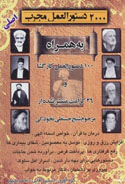Why should the prophets be free of sin and error (infallible)? Please explain.
Question:
Why should the prophets be free of sin and error (infallible)? Please explain.
Answer:
Without doubt, more important than anything else, a prophet must attract the trust of the general public in such a way that his words contain no possibility of being lies or erroneous, otherwise, his position of leadership will be a shaky one.
If they are not immaculate, using the excuse that the prophets have erred, people who seek the truth from what they say will begin to doubt their invitation. It will not be accepted, or, at least, their words will not be accepted with all of their hearts.This reason which can be called ‘trustworthiness’ is one of the most important reasons for their being immaculate.
In other words, how is it possible that God give His Commands for His people to follow a person who is not truthful for if this person were to err or sin, people would not follow him. If they do, they have erred and if they do not, they have weakened his position of leadership, in particular, since the position of the leadership of the prophets completely differs with the leadership of others for people receive their entire program of life from the prophets.
Because of this, we see that the great commentators speak about the verse,﴿يا ايها الذين آمنوا اطيعوا ا لرسول و ا ولي ا لامر منکم﴾“Obey God and obey the Prophet and those charged with authority among you.” (4:59)
saying that the command for Absolute obedience is because the Prophet is immaculate as well as ‘being charged with authority’. The pure leaders like the Holy Prophet are referred to as ‘being charged with authority’. If not, God would never give the command to unconditional obedience to them.
Another way of proving the immaculateness of the Holy Prophet in relation to any sin is that any factor of sin is condemned to defeat within the very being of the Holy Prophet.
The explanation of this is: when we turn to ourselves, we see that we, too, are immaculate in relation to some sins or evil or unacceptable deeds.
Note the following examples:
Can you find an intelligent person who thinks about eating fire or trash or filth?
Can you find an intelligent person who will walk naked through the streets and bazaars?
Clearly not! If we saw such deeds from someone, we will be assured of the fact that he is no longer normal and has become insane because an intelligent person would never do these things.
When we analyze such behavior, we see that the ugliness of such deeds is so clear that an intelligent person would never even consider them.
It is here that we can imagine what this short phrase means and say that every intelligent and healthy person is ‘free of’ unacceptable deeds.
From this stage, we take a step further. We see some people who are free from unacceptable deeds.
For instance, an aware physician and expert who knows the various kinds of microbes well is never prepared to drink the polluted water of the dirty clothes of a person who has one of the most dangerous contagious diseases whereas an illiterate person , perhaps, would be indifferent to such a thing.
With another simple example, we reach the point that however much the level of a person rises in the area of awareness, they are less likely to do evil or ugly deeds.
Taking into consideration that if a person’s faith and awareness were to rise and have so much faith in God and His court of justice, so that everything that he sees is present before his eyes, such a person will be free of all sin and every ugly deed in relation to him, like walking naked through the streets, will be in our eyes only.
For such a person, the property of something forbid den is just like the flames of fire, and just like we do not put fire in our mouths, he does not put something which is forbidden into his mouth.
We can then conclude that the prophets, because of the extraordinary knowledge, awareness and faith which they have, tame the motives of sin and the most exciting factors causing sin will not prevail upon his intellect and faith. This is why we say that the prophets are immaculate; they are insured against sin.
Refrence:
Ref: Fifty Lessons of Principles of Belief for Youths; Ayt. Makarem Shirazi; Translated by: Bahador Shirazian; Published by: Ahlul Bayt World Assembly
مطالب مشابه با این موضوع:
وبگــــــــــردی طلبۀ پاسخگو
- فایل اعمال و رفتار های خلاف قانون جناب آقای حسن روحانی
- در کنج خانه طلبهها چه میگذرد؟
- سکوت چند ساله مسئولان حوزه در قبال حملات وحشیانه به طلاب!
- می گویند که مملکت مملکت آخوندهاست!!
- یک ماجرای تلخ که خانم ها با تأمل بیشتر بخونند
- جریان های تکفیری موجود در عراق و نحوه شکل گیری آنها
- سیر تکاملی تفکر سلفیه چگونه بوده است؟
- بداء در قرآن و حدیث چگونه مطرح شده است؟
- پیامبر (ص) با مخالفین خود چگونه بر خورد می کرد؟
- سبک زندگی حضرت زهرا سلام الله علیها
- ملاک کرامت و شرافت افراد، انسانیت است یا جنسیت؟
- رنگ و پوشش های رنگی در اسلام
- حجاب، زنان را افسرده میکند و مانع پیشرفت اجتماعی آنهاست!!!
- علوم لدنی معصومین
- مگر ولی فقیه معصوم است که ولایت مطلقه دارد؟
- اگر خدا ازعاقبت ما اطلاع دارد قیامت برای چیست؟
- آیا بجای نماز خوندن، پیانو یا سه تار بزنم؟
- چرا مراسم عزاداري امام حسين(ع) پيش از شهادت ايشان صورت ميگيرد؟
- چرا امام حسين(ع) در كربلا براي رفع تشنگي از خداوند طلب باران نكرد؟
دانــــــلود های مفیـــــــــــــــــــد
- دانلود پاورپوینت شناخت وهابیت و صهیونیسم و ارتباط با همدیگر
- دانلود دو پاورپوینت اجرای عید غدیر خم
- دانلود پاورپوینت احتجاج اميرمؤمنان (ع) به غدير
- پژوهشی در کلام و پیام مقام معظم رهبری پیرامون ماه رمضان
- خطبه شعبانیه و خطبه امیرالمومنین(علیه السلام) پیرامون روزه و ماه رمضان
- دانلود پاورپوینت و pdf تفاوت های زن و مرد
- دانلود جزوه ساعات سعد و نحس(زمان نوشتن دعا)
- تقویم مذهبی شمیم یار 96 مخصوص کامپیوتر
- دانلود نرم افزار «شیعه شناسی»
- دانلود پاورپوینت ساختار خانواده و مسایل آن
- دانلود کتاب دایره المعارف جنسی
- دانلود نکات جذاب دوران عقد
- دانلود کتاب درمان سرد مزاجی و بی میلی جنسی بانوان
- دانلود کتاب حسادت کودکان
- دانلود کتاب درمان خستگی وناتوانی جنسی
- دانلود پاور پوینت اسیب های ازدواج وخانواده
- دانلود پاورپوینت هشت گام برای تحقق رویا به واقعیت
- دانلود پاورپوینت تقویت اراده
- دانلود پاورپوینت موفقیت وروشهای رسیدن به ان
- دانلود پاورپوینت هنر رفتار با افراد دشوار
- دانلود پاورپوینت جملات جالب وجذاب روحیه بخش بزرگان
- دانلود پاورپوینت راههای مقابله ودرمان استرس
- دانلود پاورپوینت نیازهای اساسی کودکان
منبــــرهای مکــــــــــــــــــتوب
- منبر مکتوب: روز عرفه و فرصت ها
- منبر مکتوب: سبک زندگی امام باقر علیه السلام
- منبر مکتوب: سه نیاز مومن (امام جواد علیه السلام)
- سخنرانی سلسله ای و چند جلسه ای مناسبت ماه رمضان
- دانلود 30 جلسه سخنرانی ماه مبارک با موضوع تنها مسیر
- موضوعات پیشنهادی سخنرانی برای محرم
- فضائل حضرت قمر بنی هاشم علیه السلام
- برکات وجود ابا عبدالله علیه السلام بر عالم
- بررسی بُعد اخلاقی،عبادی و عرفانی عاشورا
- آخرين وصيت امام حسين عليه السلام
- اولین علت رویاروی در کربلا؛ دوری از یاد خدا
- هميشه حزن؟ شادي چرا نه؟ - شب دهم محرم
- چرا نفرين ؟ - شب نهم محرم
- نماز ظهر عاشورا - شب هشتم محرم
- فلسفه عزاداری - شب هفتم محرم
- دفاع از دین - شب ششم محرم
- فلسفه حضور خانواده سيد الشهداء - شب پنجم محرم
- علم امام علیه السلام به شهادت - شب چهارم محرم
- فقدان شرایط امر به معروف و نهی از منکر- شب سوم محرم
مناظرات طلبه پاسخگو
جدیدترین های زبان انگلیسی
- Islam and Its Social System
- Duties of Man Towards the People
- Islam Various Systems
- Attributes of The Real Follower of Imams in Their Teachings
- Who is a Real Shia Muslim?
- RIGHTS OF SCHOLARS
- Islam Attacks Slavery 1
- The Advantages of Religion 2
- The Clearest Reason for Free Will
- Sheikh Zakzaky to be released on bail
- Brief History of Religions
- Is It Necessary For Man To Follow A Religion?
- The Advantages of Religion 1
- Who Is Almighty Allah?
- What are the differences between Shia and Sunni Muslims؟
- The Rights Islam Offers to Women
- How I find that Islam does not Oppress Women?
- URGENT MEDICAL TREATMENT FOR SHEIKH ZAKZAKY
- The motto of this year’s book fair is “Reading Is Ability”.
- Fundamental principles of Islam
بیشترین دانلود ها
- دانلود صوتي تکنیک های نزدیکی زن و شوهر (107879)
- دانلود رایگان کتاب خواص سوره های قرآن (54350)
- دانلود پاورپوینت بسیار مفید مهارت های زندگی (37115)
- دانلود كتاب مسائل جنسي و زناشوئي در احاديث (33489)
- دانلود پاورپوینت و pdf تفاوت های زن و مرد (33249)
- دانلود کتاب دایره المعارف جنسی (31304)
- دانلود پاورپوینت های آموزش پیش از ازدواج (30183)
- دانلود بسیار مفید پاورپوینت آئین همسرداری (29525)
- دانلود پاورپوینت آموزشی بررسی رابطه دختر و پسر (29179)
- دانلود 110جلد کتاب بحارالانوار علامه مجلسی ره (29059)
- دانلود كتاب دختران خوب به آسمان می روند دختران بد به همه جا (28123)
- دانلود کتاب آموزش جنسی آقایان (27980)
- دانلود كتاب فرق و مذاهب كلامي استاد رباني گلپايگاني (27875)
- دانلود کتاب درمان سرد مزاجی و بی میلی جنسی بانوان (27472)
- دانلود نکات جذاب دوران عقد (26998)
- دانلود نرم افزار «شیعه شناسی» (25313)
- دانلود کتاب درمان خستگی وناتوانی جنسی (24585)
- دانلود پاورپوینت روزه و روزه داری (23145)
جدیدترین مطالب سایت
- پاسخ به شبهات ولایت (4507) بازدید
- پاسخ به شبهات ولایت (4293) بازدید
- اذان در جامعه اسلامی نماد چیست ؟ و چرا فقط سه بار در روز تکرار می شود ؟ (3770) بازدید
- باتوجه به عادل بودن خداوند چرا بعضی از انسانها را ناقص الخلقه آفریده است ؟ (3840) بازدید
- ویژگی خاص قرآن چیست که کسی نمی تواند مانند آن را بیاورد ؟ (4009) بازدید
- با توجه به ترک خود ارضایی عوارض آن هنوز در من هست چگونه آن را برطرف کنم ؟ (5472) بازدید
- آیا بدن اخروی مانند بدن مادی است ؟چهره ی واقعی انسان در قیامت چگونه است ؟ (4802) بازدید
- آیا ادعای ملاقات امام زمان (عج) از جانب برخی افراد صحت دارد ؟ (4294) بازدید
- چرا به اصول و قواعد دین اسلام توجه نمی شود و پذیرش آن از سوی پیروان ادیان دیگر سخت است ؟ (4652) بازدید
- فلسفه وجود لباس روحانیت در عصر حاضر چیست ؟ (3443) بازدید
- آیا وظیفه یک روحانی تنها راهنمایی مردم و فعالیت و تدریس در حوزه هاست ؟ (2863) بازدید
- آیا نظریه تناسخ از دیدگاه اسلام پذیرفته شده است ؟ (5035) بازدید
- آیا توصیف بهشت و جهنم در قرآن تمثیل هایی برای درک بهتر آن جهان است ؟ (4636) بازدید
- با توجه به اینکه اسلام کاملترین دین هست چرا ما نسبت به کشور های غیر مسلمان عقب مانده تر هستیم ؟ (6523) بازدید
- نقش امام و رهبر در جامعه اسلامی چیست ؟ و اگر نباشد چه اتفاقی می افتد ؟ (4395) بازدید
پربازدیدترین های سایت
- زنی هستم که میخواهم به شوهرم خیانت کنم!!! (605064)
- آيا زن شوهر دار بخاطر رفع نیاز جنسی اش ميتواند صیغه شود؟ (500778)
- دوست دخترم حامله شده چکار کنم؟ (398464)
- میل جنسی زیادی دارم و به شدت داره منو عذاب می ده (340294)
- دیدن فیلم های مبتذل زن و شوهر برای تحریک شدن جنسی (217664)
- چگونه همسرمان را آماده آميزش جنسي كنم؟+18 (212995)
- حکم شرعی نزدیکی از پشت! (207880)
- خانم هایی که می خواهند طلبه شوند بخوانند!!! (205205)
- زنم رابطه جنسی برقرار نمیکند!!! (199520)
- از تجربه های تلخ و تکان دهنده دختران بخوانید شاید... (172270)
- گناه با محارم خود داشتم! (146172)
- رابطه جنسی دهانی حكم چيست؟ (130606)
- محرمات و مکروهات و مستحبات حائض+حکم ورد به امکان مقدسه (129373)
- به رابطه خانمم با خواهر زاده اش مشکوکم؟ (122968)
- سفارش اسلام در مورد آمیزش صحیح چیست؟ (98959)
- نام كتاب حضرت نوح و حضرت ابراهیم؟ (96879)
- با زنان چشم سبز ازدواج نکنیم؟ (94523)


















